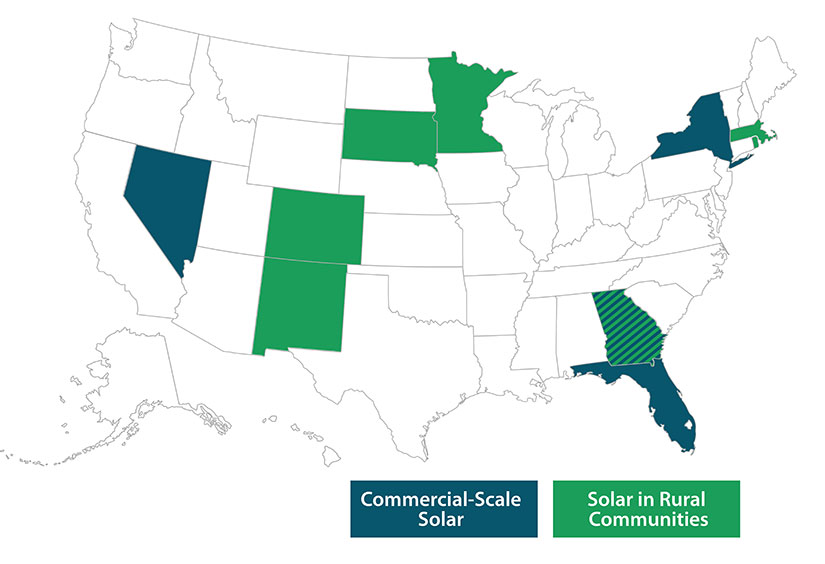NREL Supports Innovators as They Pursue New Ideas for Rural and Commercial-Scale Solar
NREL’s Solar Energy Innovation Network Provides Expertise and Support as Teams Explore Novel Applications of Solar Energy
In early 2020, eight teams from across the United States were selected to develop and test novel applications of solar energy in rural communities and commercial-scale settings as part of the second round of the Solar Energy Innovation Network. Now, work is well under way, with common themes including solar-plus-storage, community solar, the resilience benefits of solar, and quantifying the value of solar in distributed systems.
Activities began with virtual kick off workshops in April and a working session in May. While the kickoff workshops gave each team an individual introduction to the Innovation Network and its staff, all eight of the teams convened (virtually) for their first working session—a hallmark of the Innovation Network.
Working sessions give teams a structured space to discuss common challenges, share lessons learned, and test out planned project outcomes. Facilitation from the Rocky Mountain Institute and technical perspectives from the National Renewable Energy Laboratory (NREL) staff helped to ensure productive collaboration. While the virtual aspect of these events was new, the nuanced, small-group discussions that usually characterize Innovation Network gatherings persisted.
“By providing technical expertise and facilitated stakeholder engagement, the Innovation Network helps teams explore unique solutions that are tailored to meet the needs of the stakeholders in their community,” said Eric Lockhart, who leads the Innovation Network at NREL. “The collaborative program structure then helps turn that new experience and knowledge into something that can be broadly replicated in other communities.”
Round 1 of the Innovation Network launched in spring 2018. Round 2 teams were selected in spring 2020, and their projects will run through summer 2021. Over the course of 15 months, the teams will discuss challenges, share ideas, and stress-test their solutions. At the end of their projects, teams will present at an NREL-hosted symposium, sharing their work with other organizations that are interested in similar efforts, and will publish their findings as blueprints for others.
The Round 2 teams are divided into two cohorts, each of which share common challenges and goals.

Solar In Rural Communities
One cohort is composed of teams that are tackling barriers to solar energy in rural communities. Many of the teams are considering solar for electric cooperatives and the use of energy storage paired with solar on wide-ranging, rural electric distribution systems.
The following teams were selected:
- Community-Informed Proactive Solar Siting and Financing in Massachusetts
- Lead Organizations: University of Massachusetts Clean Energy Extension and University of Massachusetts Amherst
- Organizational Innovation for Solar Deployment With Electric Cooperatives
- Lead Organizations: University of Minnesota and East River Electric Power Cooperative
- “Solar-Plus” for Electric Cooperatives: Guidance and Documents for High-Value Procurement
and Operations
- Lead Organization: Cliburn and Associates LLC
- Evaluating the Use of Energy Storage to Manage Solar Interconnection Costs in Rural
Rhode Island
- Lead Organizations: Rhode Island Office of Energy Resources and Rhode Island Division of Public Utilities and Carriers
Commercial-Scale Solar
Teams in this cohort will identify and address barriers to commercial-scale solar (i.e., photovoltaic systems ranging in size from approximately 50 kilowatts to 3 megawatts). Solar systems of those sizes are generally less common than their larger, utility-scale or smaller, residential-scale counterparts. Broadly, teams in this cohort are exploring using solar-plus-storage systems to help unlock that market segment.
The following teams were selected:
- Overcoming Barriers to Community Shared Solar Plus Storage
- Lead Organization: Sustainable CUNY of the City University of New York/Smart Distributed Generation Hub
- Creating an Innovative Urban Energy Resiliency Hub
- Lead Organization: Groundswell Community Power
- Quantifying the Resilience Value of Solar Plus Storage in Reno
- Lead Organization: City of Reno
- Clear Sky Tampa Bay: A Regional Framework for Enhancing Resilience through Solar Plus
Storage
- Lead Organization: Tampa Bay Regional Planning Council
A Unique Program Structure Brings Teams Together
NREL, Lawrence Berkeley National Laboratory, and the Rocky Mountain Institute are helping the eight teams realize and demonstrate the often never-before-tried applications with extensive analytical and modeling support and facilitated stakeholder engagement.
Teams are comprised of diverse stakeholders, and that expertise helps teams ensure all perspectives are heard, key barriers are identified, and the resulting solutions are robust and ready for replication in other contexts.
“Part of what makes this program so unique is the unparalleled access to the expertise the three partner organizations provide,” Lockhart said. “NREL and Lawrence Berkeley National Lab provide world-class modeling and analysis to the teams, and the Rocky Mountain Institute brings a well-practiced expertise in convening and coordinating stakeholders.”
The Innovation Network is a collaborative research effort led by NREL and supported by the U.S. Department of Energy’s Solar Energy Technologies Office. Visit the Solar Energy Innovation Network Round 2 webpage to learn more and sign up to receive updates as the second round progresses.
This article has been updated to reflect an editorial change made after its original publication.
Last Updated May 28, 2025
